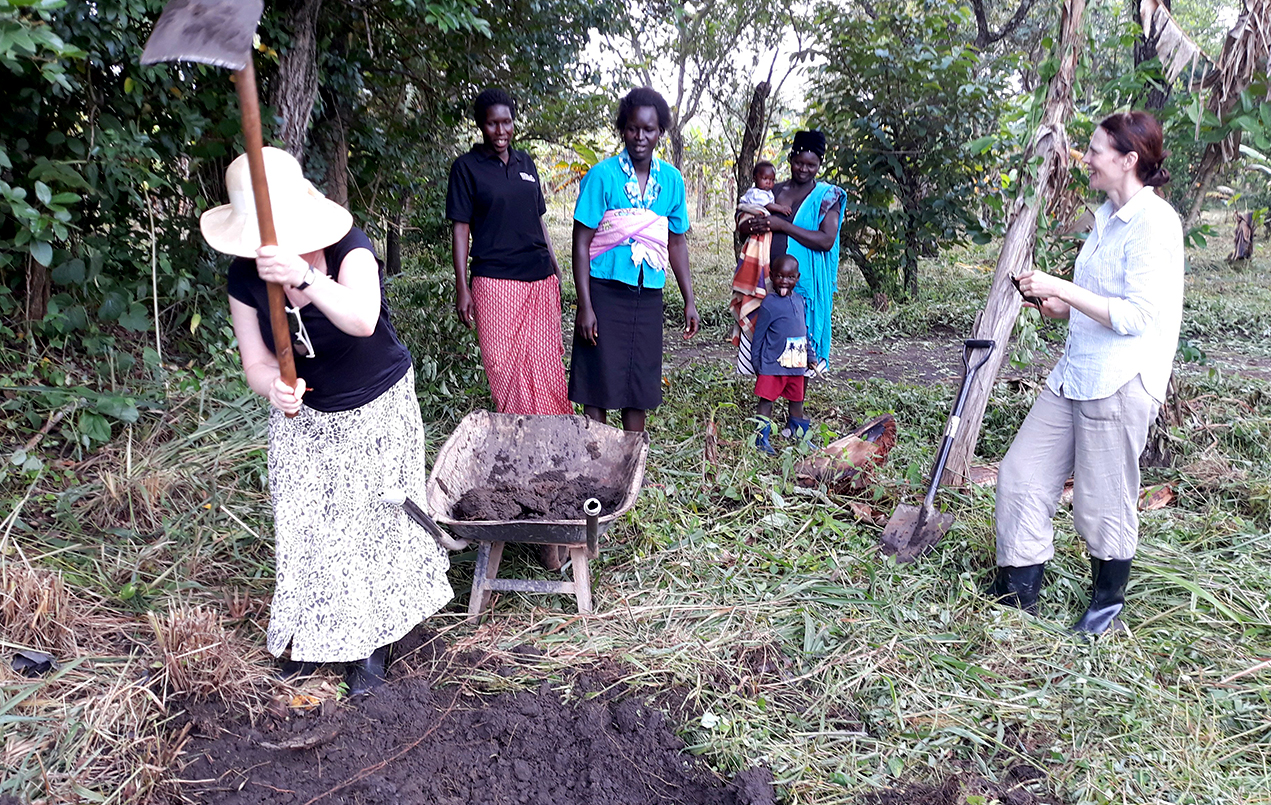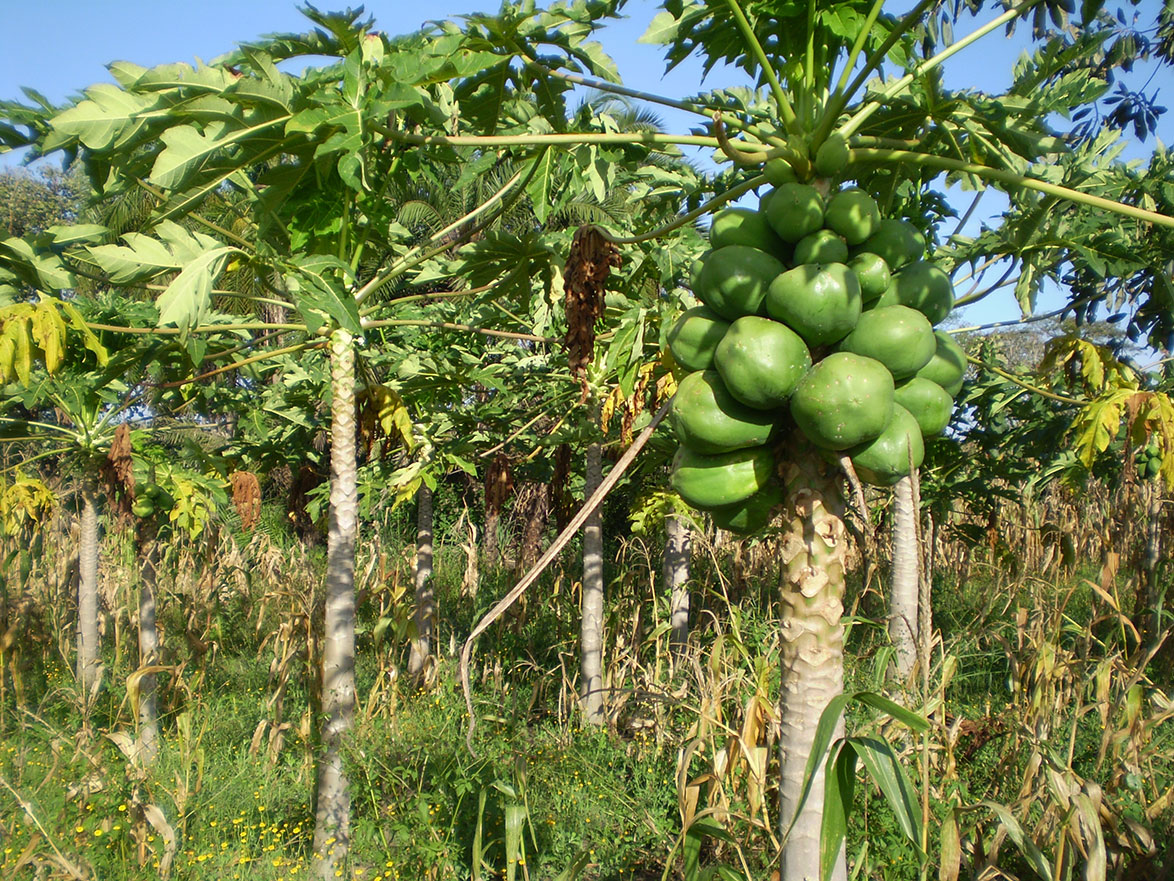
My visit to Third Hope in 2019 by Peter Iles
As we drive the bumpy unmade road up to the open gates, facing us are eight women in two lines, enthusiastically dancing and singing, one waving a green leaf and branch. As we get out and shoulder our luggage, they turn and lead us, dancing and singing, along the whole length of the main path through Third Hope farm, to the building that will be our home for a week. We are told they are singing words like ‘We thank God for our visitors, and for giving them a safe journey, and that God would bless their stay’. It is a heart warming and very moving welcome.
Our rooms are simple but comfortable, beds with mosquito nets, a wooden shelf unit and table. The wash area in the corner, separated by a wall and curtain, is equipped with a yellow plastic ‘jerry can’ of water, a bowl, and a jug to pour the water over yourself. After trying a dousing with cold water, I decide to thankfully add some hot water from the large thermos flask provided! The water for washing is fetched from a nearby structure that funnels rain water into a tank. Water for drinking is hand pumped from a borehole, sited near the main gate so that locals can also use it. Composting toilets complete the essentials, clean, with no smells (unlike the traditional ‘long drop’ toilets), just requiring a cupful of sawdust after each use, and emptying each week onto a heap which transforms in a few months into rich compost.
After settling in we start meeting the people. There are the team leaders, the site team, the kitchen/welfare team, and security. These 20 or so people are developing the farm and the buildings and are joined each week by 20 ex-child soldiers who are on this year’s Agricultural Course. The course combines learning sustainable farming and practical skills with activities to help with coming to terms with their past. Each one of these people greets us in their gentle Acholi manner and we respond. It was humbling to sit with them and meet the eyes of these people who had experienced such darkness as children, hostages to an army where violence was the only way of life.
The farm is a wonderful area of natural beauty, which is healing to walk around. Many trees have been planted, and are bearing fruit, including mango, papaya, avocado, brother heart, jack fruit, bananas and oranges. Each evening we sit down to discuss the day over a wonderful meal of local food, followed by slicing up one or more of these succulent fruits. We discuss the issues on our minds; the dilemmas that arise in the team’s families and community for which Rose-Mary and David provide as much care as they are able. Then there is the future of Third Hope, aiming for members of the team to take on more responsibility as they grow in the work. The need for funds to support a further 30 ex-child soldiers who are hoping to join the course next year. The need for sensitivity and wisdom with regards to the group and individual discussions and counselling offered as part of their recovery.
During the day we are shown the work carried out on the farm, slashing the long grasses to clear the land, moving seedlings that are being nurtured and making a hole with a hoe to plant them. They will be protected from goats with a small fence, watered to feed them through the dry season, so that they grow into trees bearing more fruits. We are also shown the carpentry workshop where trainees learn skills, including making furniture, the tailoring workshop with one treadle powered sewing machine, making patchwork quilts, and a workshop making various small crafts. The products will be used by the trainees, or on the farm, or sold for additional income. Our schedule includes some time for sports, with badminton and volleyball played by all ages, men and women, and of course a game of football. This is played with much energy, competition, and laughter, it’s so good to see the enjoyment.
We are also taken to the second area of land where a Peace Centre is being developed, the vision of a Third Hope African trustee, sadly no longer with us. It is another area of beautiful land bursting with nature. A number of exhibition huts are being built for the Peace Centre, including a house of humility, a house of tears, a house of separation. These are used to encourage discussion about aspects of war, how to accept, forgive, and manage the trauma of their experiences.
At the request of the team the farm routine includes times of prayer and worship (including dance of course; this is Africa!) which we join in with. And along with our individual farewells, the final meeting is memorable as we in turn, in the Acholi way, say our thanks for their welcome and hospitality, and they say their thanks for us visiting, before breaking into a final song with dancing. A heart-warming and moving farewell to a visit where I’ve been able to experience the reality of Third Hope.
Why the name Third Hope?
The name comes from a local proverb. The first hope springs from birth and the gift of new life. However, we soon grow and lose our innocence but we carry with us the second hope, a belief that in time, good things in life will come our way: a partner, children of our own, work we enjoy. War kills this second hope, destroying families, livelihoods and futures.
The question then arises “Is there a third hope? Is there a way through this devastation to restoration, healing and wholeness?”
Peter Iles – Trustee of Third Hope

